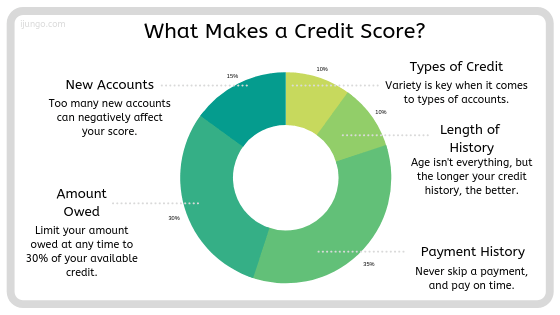

You know that as a loan officer or real estate agent, your job is about a lot more than simply closing deals. When home buyers have any questions about the process, it’s part of your job to help guide them. Whether they’re brand new home buyers or not, they will appreciate your expertise and willingness to help. This will set you apart from your competition, and contribute to an amazing customer experience.
With this in mind, one of the frequent roadblocks to successfully getting a mortgage and buying a home is having credit problems. For many people, credit scores are an overwhelming subject. After all, it can sometimes feel like an arbitrary number that can determine whether or not you will be given a home mortgage. Additionally, the contributing factors to a credit score can be a bit murky.
That’s why we wrote this article! It’s geared toward your customers who may need guidance to improve a credit score for a mortgage loan.
This content could be shared on your blog or website. Or even sent as an educational email to leads in your database that are prospective home buyers.
So, what do you know about mortgages and credit scores that your borrowers don’t?
Tips to Improve Your Credit Score to Qualify for a Mortgage
For many people interested in buying a home, one major stumbling block can be a damaged credit history. Whether you are a first time homebuyer with a short credit history, have faced financial difficulties in the past, or simply want to boost your credit to get the best mortgage terms possible, I wanted to share some ways that you can improve your credit score.
Here’s what you need to know:
Why Are Credit Scores Important?
We all know that credit scores are important. They can determine your eligibility to rent, earn a mortgage, and can even affect employment opportunities.
But some people may not know that your credit score also determines the mortgage rate you will pay. It can even determine how much you’ll pay if you need private mortgage insurance (PMI). For conventional financing, most borrowers will need a credit score above 620 to even be eligible for a mortgage. Higher credit scores will earn you better interest rates.
How can credit scores affect interest rates?
For example, a 750 credit score might qualify you for a 3.625% rate on a $200,000, 30-year mortgage. This would produce a monthly payment of $912.
On the other hand, with a credit score of 625, the interest rate for that same mortgage might be 4.125%. This would make the monthly payments $969.
This difference in monthly payments ($57 per month) may not sound like much. However, over the course of the 30 year loan, that’s an extra $20,520.
How can credit scores affect loan-to-value ratio?
If you want to take out a loan, or borrow against the value of your property, your loan-to-value (LTV) ratio will be calculated. A LTV is the percentage of a property sale price, or appraised value, that you could borrow.
A lender may choose to limit how high a borrower’s LTV can go if their credit scores are low. Especially for jumbo and non-comforming loans, borrowers may be disappointed in their LTV if they have a less than stellar credit history.
How can credit scores affect Private Mortgage Insurance (PMI)?
If a borrower’s down payment is less than 20%, their lender will require them to have Private Mortgage Insurance (PMI).
Credit score can drastically affect how much PMI will cost, which can make thousands of dollars of difference to the borrower in the course of a year.
What Factors Make Up a Credit Score?
According to FICO, there are five main factors that make up a credit score.

Payment History
Your payment history makes up 35% of your credit score. Past long-term payment history is thought to forecast future payment trends. This can be a frustrating reality for customers with less than exceptional credit histories. After all, the idea that your past credit mistakes follow you around, and negatively affect your chances of getting a mortgage isn’t exactly a cheery one.
If you find yourself in this position, don’t get discouraged! Your payment history can be improved.
Length of History
If you are younger, you may face issues surrounding the length of your credit history. This contributes to 15% of a credit score, so it is an important factor to consider. This makes sense, since a longer credit history shows a borrower’s financial history far better than a shorter one does.
Newer credit scores can still be excellent, as long as you focus on never missing payments and utilizing a low amount of your available credit.
Types of Credit
Credit mix makes up 10% of your FICO score. Basically, a good credit mix shows that you can handle multiple types of credit. This generally shows that you are a more responsible borrower.
Amount Owed
Credit utilization, the amount of available credit used, contributes to 30% of a credit score calculation. Therefore, this is one of the most important things to consider if you want to improve your credit score.
It’s often said that utilizing 30% or less of a credit line is a good rule of thumb, but this varies from person to person. Just remember that the absolute best credit scorers have an average credit utilization of less than 6 percent.
New Accounts
You should remember that you should only apply for and open new lines of credit when they absolutely need to, since new credit makes up 10% of a credit score. After all, new accounts will lower the average age of your credit, which negatively affects your overall score.
How Can You Improve a Credit Score for Mortgage Loans?
One of the first ways to improve a credit score for mortgage loans is by examining what factors make up a credit score. From there, you can determine the best practices that will then help turn a score from “eh” to “excellent.”
Dispute Mistakes
Mistakes happen, even when it comes to credit scores. Because of this, it’s important that you dispute any fraud or incorrect information. This will improve a credit score for mortgage borrowers, and is a relatively easy way to turn a credit score around.
Pay Off Collection Accounts
The presence of accounts in collection are an instant red flag for lenders. Focusing on paying off collection accounts, no matter how old the account is, or how much is owed will very quickly improve a credit score for mortgage loan qualification.
Improve Your Credit Utilization
If your credit utilization is too high, the easiest way to address this is to pay down some accounts, and use less of your credit line every month. However, this isn’t always possible. If you face high credit utilization, you have a couple of options. You could ask for a credit limit increase from your creditors, which would expand your ratio. Otherwise, you could also open a new credit card, and commit to keeping the balance at zero. Both of these methods may have short term negative effects on a credit score, but they will improve a score over the long term.
Pay On Time, Always
Paying bills on time may feel like the most basic of credit score tips, but that’s for good reason: it works! Late payments are an instant way to damage a credit score. Therefore, if you truly want to improve your credit score, encourage them to make a habit change.
Become An Authorized User On Another Card
It may feel like a drastic measure, but if you are facing a poor credit report, you could become an authorized user on someone else’s credit card. This other, well-managed credit will appear on your credit report, and can improve a credit score for mortgage applications. It’s important that the balance of this card is always paid off, and the payments are always on time–otherwise, you will face even more problems than before.
Bottom Line
There’s no doubt that credit scores are important, especially when it comes to getting approved for a mortgage. Improving your credit score can send you on your way to purchasing your dream home. I am always here to answer any questions you may have, and discuss ways that you can make positive changes for your financial future.
And just remember, credit score isn’t everything! If you are struggling with a poor credit report or other roadblocks to qualifying for a mortgage, I’m here to help.






